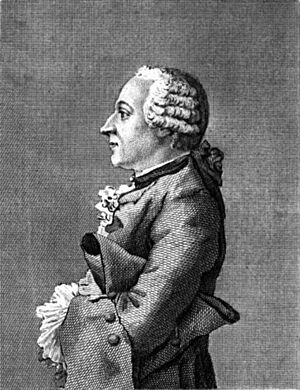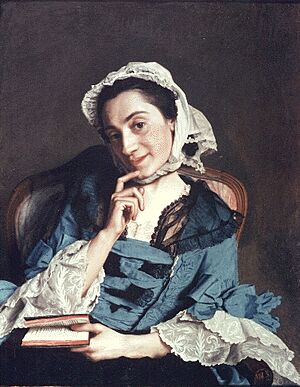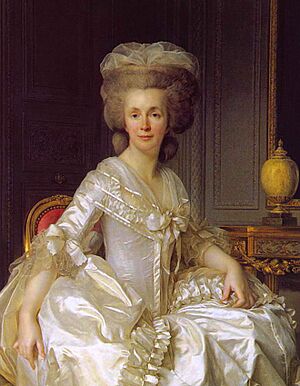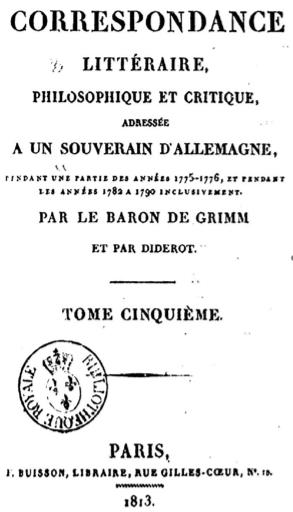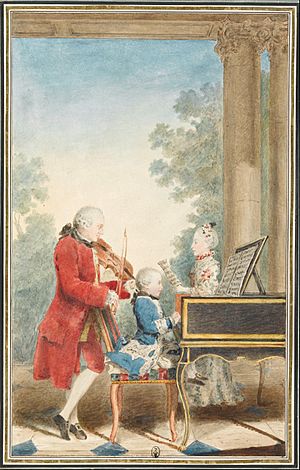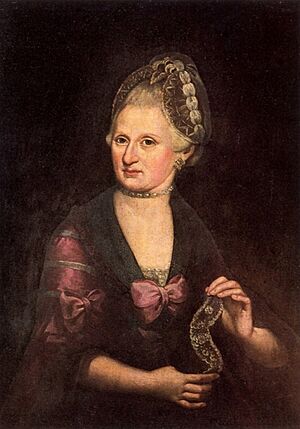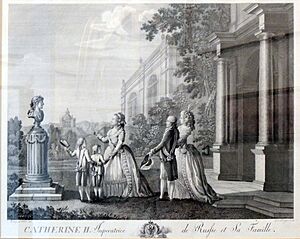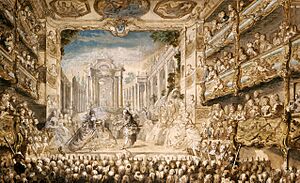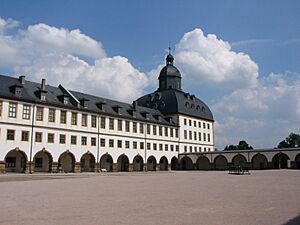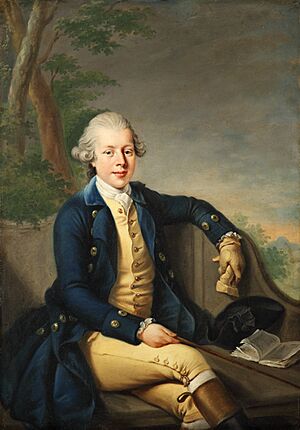Friedrich Melchior, Baron von Grimm facts for kids
Friedrich Melchior, Baron von Grimm (born September 26, 1723 – died December 19, 1807) was a German writer who became famous in France. He was a journalist, an art critic, and a diplomat. He also helped write the famous French encyclopedia called Encyclopédie. In 1765, Grimm wrote an important article for the Encyclopédie about lyric and opera librettos (the words of an opera). Like composers Christoph Willibald Gluck and Ranieri de' Calzabigi, Grimm was very interested in making opera better.
Contents
Early Life and Studies
Grimm was born in Regensburg, Germany. His father, Johann Melchior Grimm, was a pastor. Friedrich studied at the University of Leipzig. There, he learned a lot about classical literature from his teachers, especially Johann August Ernesti. When he was 19, he wrote a play called Banise, which was quite successful.
After two years of studying, he went back to his hometown. He then worked for the Count Schönborn. In 1749, he traveled to Paris with the young Schönborn. In Paris, he became the secretary for Count August Heinrich von Friesen. Jean-Jacques Rousseau wrote in his book Confessions that Grimm played the harpsichord (a musical instrument) and read to the eldest son of Frederick III, Duke of Saxe-Gotha-Altenburg.
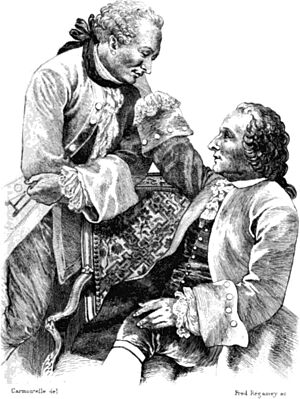
Grimm quickly became good friends with Rousseau. They both loved music and theater. This friendship led Grimm to meet other important thinkers of the time. These included Denis Diderot, Baron d'Holbach, d'Alembert, and Claude Adrien Helvétius. They all met at the salon (a social gathering) of Marie-Charlotte Hippolyte de Campet de Saujon. Grimm quickly learned French and fit in perfectly with French society.
In 1750, he started writing for the Mercure de France about German literature. In 1752, during a big debate about opera called the Querelle des Bouffons, he wrote a letter about the opera Omphale. Grimm complained that the words of the opera did not match the music. In 1753, he wrote a clever pamphlet called Le petit prophète de Boehmischbroda. This writing defended Italian opera and made him famous in the literary world.
The Correspondance littéraire
In 1753, Grimm started a special literary newsletter. He sent it to different German rulers. The first issue of his Correspondance littéraire, philosophique et critique came out on May 15, 1753. With help from friends like Denis Diderot and Louise d'Épinay, Grimm wrote this newsletter. It was published twice a month. The copies were carefully made by hand in Zweibrücken, outside of France, to avoid French censors.
Grimm's newsletter had many important subscribers. These included Catherine II of Russia, Gustav III of Sweden, and many German princes. Madame Geoffrin, a famous salon host, helped Grimm get Stanislas Poniatowski as a subscriber. She told the king that the letters were very private and should not be copied.
The Correspondance was kept secret and was not shared during Grimm's lifetime. It covered almost all topics from 1750 to 1790. Later volumes (1773-1790) were mostly written by his secretary, Jacques-Henri Meister. Grimm's early writings just listed new books and ideas. But over time, his reviews became longer and more critical. He wrote about politics, literature, art, society, and religion. He was often strict in his opinions about people, but fair in his literary judgments. Many of his criticisms have proven true over time. His writing style was very French. He was often calm in his reviews, but his taste in literature was very refined.
What was in the Correspondance?
For several years, Grimm wrote about the painters and paintings shown at the Salon de Paris. Later, Diderot took over this task. Grimm admired architects like Jacques-Germain Soufflot and Claude-Nicolas Ledoux. He also praised the naturalist Buffon and the mathematician Leonhard Euler. Grimm asked Diderot to review Voyage autour du monde (A Voyage Round the World) by Louis Antoine de Bougainville. Grimm also paid attention to important events like the case of Jean Calas and the disagreements between Rousseau and David Hume. The Correspondance became a way to spread information, sometimes even false information, about Rousseau.
Grimm did not like Mondonville's opera Daphnis et Alcimadure, even though he liked that it used the Occitan language, which he felt was closer to Italian. He also wrote about the singer Caffarelli and the writer Pierre Beaumarchais. The Correspondance continued without Grimm until 1790, the year of the French Revolution.
Important Connections
In 1755, after the death of Count von Friesen, Grimm got a new job. He became the secretary for Marshal d'Estrées. This job paid him 2000 livres a year. In 1759, he became the representative for the city of Frankfurt at the French court. But he lost this job because he criticized the comte de Broglie in a letter that was secretly read by Louis XV's secret service.
Grimm and Jean-Jacques Rousseau
In 1751, Rousseau introduced Grimm to Madame d'Épinay. Two years later, Grimm and Madame d'Épinay started a close relationship that lasted 30 years. This eventually led to a serious disagreement between Grimm, Diderot, and Rousseau.
Grimm and Baron d'Holbach helped support the mother of Thérèse Levasseur. Instead of Rousseau, Grimm went with Madame d'Épinay to Geneva to see a doctor. Rousseau later wrote in his Confessions that Grimm had a very negative impact on his life. Grimm criticized Rousseau's books Julie, or the New Heloise and Emile, or On Education. Rousseau's anger led him to write a very unkind description of Grimm in his Confessions. Grimm's actions also made Diderot angry, leading Diderot to write critical letters about him in 1781.
In 1783, Grimm lost Madame d'Épinay, his closest friend. The next year, Diderot also passed away.
Mozart's Visits to Paris
Leopold Mozart decided to take his two talented children, seven-year-old Wolfgang and 12-year-old Nannerl, on a "Grand Tour" of Europe in June 1763. Their first visit to Paris was from November 1763 to April 1764. Many of Leopold's letters of recommendation didn't help, but the one to Melchior Grimm did. Grimm was a German who had moved to Paris and loved music and opera. He was a journalist who wrote for European aristocrats. He agreed to help the young Mozart children.
Grimm wrote a very positive article about the Mozart children in his Correspondance littéraire in December 1763. This helped Leopold and his children enter Parisian high society and musical groups. The Mozarts performed at Versailles, where they stayed for two weeks. Grimm proudly shared stories of young Mozart's amazing musical improvisations. Leopold had four of Wolfgang's sonatas published and dedicated them to King Louis XV's daughter. In 1766, Carmontelle drew a group portrait of the family performing, which Grimm helped to get engraved.
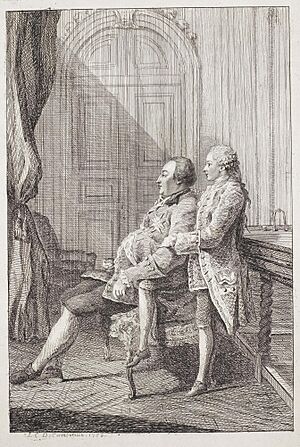
After long stays in London and Holland, the Mozarts finished their "Grand Tour" by stopping in Paris again from May to July 1766. This was Mozart's second visit. Again, Grimm helped and guided them. By then, the children were 10 and 15, and Parisians were a bit tired of child prodigies. Grimm wrote another very praising letter about the Mozarts in his Correspondance littéraire on July 15, 1766. He noted Mozart's great progress and predicted that he would soon have an opera performed in Italy.
However, Grimm was not always accurate in his musical judgments. His second prediction was not as correct: "If these children live, they will not remain at Salzburg. Before long monarchs will vie for their possession." In reality, Mozart struggled to find a steady job as an opera composer and remained a freelance writer for most of his life.
Leopold sent Mozart, then 22, to Paris for his third and final visit from March to September 1778. This time, Mozart went only with his mother, Anna Maria Mozart, while Leopold stayed in Salzburg to keep his job. Grimm helped and advised Mozart and his mother again. But Mozart faced many disappointments. Sadly, his mother, Anna Maria, became ill and died on July 3, 1778. After her death, Mozart moved in with Grimm and Madame d'Épinay. For the first time, Mozart was on his own.
Grimm, a man with strong opinions, and Mozart did not get along very well. Mozart found Paris to be "incredibly dirty." Grimm complained that Mozart wasn't trying hard enough to get students. Mozart felt that calling on people was tiring and expensive. He said, "People pay their respects, and that's it. They arrange for me to come on such and such a day; I then play for them, and they say Oh, c'est un prodige, c'est inconcevable, c'est étonnant. And, with that, adieu." He was not paid for some of his musical works.
Mozart did have one big success in Paris with his Symphony No. 31 in D, known as the Paris Symphony. It was performed on June 18, 1778, and received "unanimous acclaim." Still, Mozart found Paris "totally at odds" with his musical style and personality. He often expressed his dislike for the French people and their language, which he found unmusical. He thought French music was "worthless."
Mozart became suspicious of Grimm. Grimm also found Mozart confusing, with his mix of confidence and dreaminess. Mozart had to borrow money from Grimm. The death of Voltaire in May 1778 highlighted the big differences between Grimm and Mozart. Grimm warned Leopold that Paris was too demanding for Wolfgang. Leopold agreed that Mozart should leave Paris. Grimm arranged for Mozart's trip, but the journey was longer and more difficult than promised. Mozart left Paris on September 26, feeling unhappy.
In total, Mozart spent 13 months in Paris during his three visits, always with Grimm's help and guidance.
Grimm and Catherine II of Russia
Grimm met Catherine II of Russia in Saint Petersburg in 1773. He was part of the group accompanying Wilhelmina of Hesse-Darmstadt for her marriage to the Tsarevitch Paul. A few weeks later, Diderot also arrived. Both Grimm and Diderot became members of the Russian Academy of Sciences. Grimm became a minister for Saxe-Gotha at the French court in 1776. In 1777, he visited Saint Petersburg again and stayed for almost a year.
Grimm enjoyed playing chess and cards with the Empress. He influenced Catherine with his ideas. He also acted as her agent in Paris, helping her buy works of art. With his help, the libraries of Diderot (in 1766) and Voltaire (in 1778) were bought and sent to Russia. In 1787, Catherine asked Grimm to burn her letters to him, but he refused. After his death, the letters were returned to Saint Petersburg.
Grimm and Opera Reform
Like the composers Christoph Willibald Gluck and Ranieri de' Calzabigi, Grimm was very interested in improving opera. He loved theater and often criticized the Comédie-Française, a famous French theater. He praised the private theater of Madame de Montesson, who was the wife of his employer.
In 1776, the Paris Opéra was in financial trouble. A group of wealthy people suggested Chevalier de Saint-Georges as the next director of the opera. Grimm supported Saint-Georges, who lived next door to Grimm's employer. Mozart also lived near Saint-Georges for over two months. The two mansions shared a garden, a chapel, and a theater.
Later Life and Retirement
In 1792, during the French Revolution, Grimm left Paris and moved to Gotha, Germany. He lived in the ducal palace, Friedenstein Palace. He was not wealthy, but Catherine II helped him. Shortly before her death, she appointed him as Russia's minister in Hamburg. Although he wasn't very excited about the job, he traveled there with Émilie de Belsunce, Madame d'Épinay's granddaughter.
On January 17, 1797, Grimm suddenly became blind. He had had problems with his eyesight since 1762. Because of his blindness, he gave up his new job. He and Émilie stayed in Altona for a few weeks. Then they traveled to Braunschweig, where they lived from 1797 to 1800. Grimm was then invited back by Ernest II, Duke of Saxe-Gotha-Altenburg. He died in Gotha on December 19, 1807.
An asteroid, 6912 Grimm, was named after him.
Works and Legacy
Grimm's most famous work is his Correspondance littéraire, philosophique et critique. This collection of letters and criticisms was published after his death. It gives us a great look into the cultural and social life of Paris in the 1700s. Many different editions of his Correspondance have been published over the years.
Grimm also wrote a historical memoir about his connection to Empress Catherine II. His letters to Catherine II were also published, showing their close relationship. Catherine called him by nicknames like "Heraclite." She asked him to burn her letters during the Revolution, but he refused. After his death, they were returned to Russia.
 | Ernest Everett Just |
 | Mary Jackson |
 | Emmett Chappelle |
 | Marie Maynard Daly |


